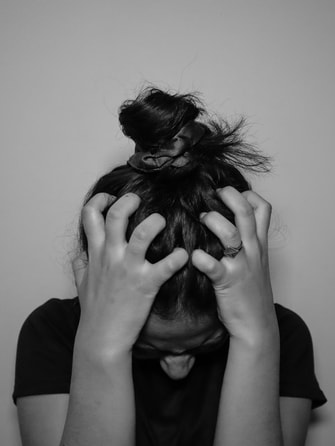 Most of our current problems are solutions our past self came up with when it didn't have more options or resources. Our patterned responses to people, situations, and internal experiences might not be helpful to the person we are today. But those patterns can be traced back to a time in our life when this was the solution (whether from a place of creativity or lack of resources) we came up with considering the context we were in at the time. As we move through life, there will always be signs showing us when our old solutions have become outdated and ineffective. Here's an example from my life. The summer before I turned 15, I started smoking cigarettes. It was a solution for fitting in and belonging in my small, but very close friend group. Over time, this habit became an identity and a way to socialize with people. I dragged this 10 year old habit with me to the U.S. where, almost overnight, it became a real impediment towards who I wanted to be. Smoking was more complicated to maintain in the U.S. than it was in Serbia and as I started paying more attention to my health and lifestyle. Being a smoker was a layer of identity I was fully ready to shed. I quit and never looked back. So next time you feel stuck in a reoccurring problem or a habit that seems hard to ditch, try to have a bit more compassion and respect for these patterns. See if you can understand how and why you developed them in the first place and how they might have been the right solution at a different time in your life. Reflection Questions:
 In the self-improvement space, it's not unusual to hear people say they want to be the best version of themselves and reach their full potential. But who is that best version of ourselves? Why does it always feels out of reach? What's wrong with this current version? And is this potential everyone demands is so important even reachable? Working to reach our full potential implies it is something we achieve after we take a specific set of steps. It's where we get to after we "work on ourselves." But what exactly are we working towards? Promises, promises... Continuously bettering ourselves can feel meaningful, even superior. It is seductive because it keeps alive promises that supposedly await at the end of this pursuit. Directly or indirectly, it promises a psychological state of serenity, bliss, actualization, wisdom, and an existence of no suffering, no insecurity, no rejection; an existence filled with confidence, fulfillment, success, abundance... It promises transcendence of an ordinary existence. So in order to not settle, or God forbid be an average person, we keep pursuing and seeking and improving and healing. But so frequently these attempts to reach our full potential feel like attempts to escape, rise above, and heal ourselves out of basic human experiences. The reality is... When we embark on the quest of chasing something illusive and nebulous, as it often is the case with becoming the best version of ourselves, it can easily turn into a never ending pursuit that doesn't have a clear definition, hence no clear arrival point. So, I conclude that reaching one's potential simply isn't reachable, it CAN only be a continuous chase. A quest that briefly soothes those feeling lost and confused because it will keep one busy, committed, and exhausted! It may feel like a full time job. A constant analysis of one's deficiencies and limitations. A never ending quest of fixing oneself and trying to heal ourselves out of normal human experiences. It becomes an exhausting chase of a future ideal that can never be completed. And the more we chase it, the more we feel broken, unworthy, and never as happy as we "could" be. Giving up the chase is not a defeat. Giving up on the idea of reaching our full potential may feel like a defeat. But it doesn't have to be if you're open to a different perspective. The chase makes us preoccupied with what we're lacking and with what's wrong with us. It takes us away from wholeness and the aliveness of this moment, which is the only moment we actually have. The chase requires us to pause (or dismiss) the present in order to work for that extraordinary future in which we hope to be better, more actualized, more whole, more healed. A road to fulfillment or burn out? If self-improvement excites you, make you feel more connected to yourself and others, makes you feel alive and fulfilled, brings you a sense of healthy ambition and ultimately adds to your life, keep at it! But if starts feeling exhausting, life consuming, expensive, and dreadful, maybe it's time to take a pause and reevaluate. When empowerment, self-trust, and self-determination become replaced by self-doubt, overthinking, and continued dependence on someone else's input and wisdom, you might be on a road to burn out. This is when it's time to seriously consider whether the pursuit is turning out to be what it promised. We don't need more fixing... I believe that the cure for feeling dissatisfied isn't in fixing ourselves but in understanding who we are and fully letting ourselves be it. It's about embracing ordinary moments, loving what we do have, and trusting our inner guidance. In those moments when I feel like what present is offering me isn't enough, when I feel like I need more to be happy, and I start glorifying what I don't have, thinking that it would fulfill me - I think of my mom. She died 8 years ago from metastatic breast cancer. I know she would love to fully be in this moment as ordinary and simple as it may be. She would love to just sit outside and drink coffee, cook a meal, spend an afternoon with her grandkids, make plans, tend to her vegetable garden, admire the beautiful roses in her yard, talk to me for hours. It's a simple idea (I'm yet to master irl) and constant reminder (at least for me) that embracing these ordinary moments and finding joy and gratitude in every day experiences IS our highest purpose. All the what if's...
 I have to say that, so far, I'm loving my "year of less." We are only in January and I had a noticeable positive shift as a result of it. Externally, not much has changed. I engage with similar activities as I have in the past year and my routines have not changed much. But, wait! The restlessness I would often feel when I wasn't busy, is no longer present. Specifically, there is no internal pressure to do something "important" or productive with my time. I am not exaggerating when I say that, for the first time after a very long time, I feel at peace doing nothing. Doing nothing was my nemesis and a biggest "waste" of time. But I am learning how to appreciate the joy of wasting time. In case you too, find yourself struggling to relax, want to be more at ease, and be an expert at wasting time without feeling guilty, here are a few reminders that helped me. As always, take what resonates and make it yours, and disregard the rest. 1. I get to do whatever I feel like with my time. No matter how 'unproductive' it may be considered by societal standards, if I enjoy myself, feel good, rested, or had fun, it is absolutely worth my time. 2. Question the idea of wasted time. There is no inherent value in any specific activity or way of being, there are just different things I get to do in different moments - none of them are "better" than the other. If there is something "better" to do, I would be doing it. 3. Question the pressure for productivity. Will my life really be better if I'm more productive? Is this coming from me or did I buy into this idea? Also, thinking about productivity is not productive. Pressuring myself to be productive, but wanting to relax, is also not productive. Doing something that feels good to my soul is always productive. 4. Address the fears associated with wasting time. Your mind will offer you all sorts of doomsday stories about what will happen if you stopped forcing yourself to be productive. In reality - absolutely nothing will change. Like me, you might notice yourself engaging in the same activities without the unnecessary pressure to do something more important. And less pressure means more available energy for the things you actually enjoy. 5. Throw out the idea of earning rest. If you're a perfectionist, overachiever, or like to punish yourself in similar ways, at first, this might be difficult to embody. Feeling like you need to be productive before resting or having to earn rest might be deeply engrained in you. Even the self-care practices we often hear about are suggested for the sake of being more productive later. No thanks! 6. What you value matters. Think about your current values (how you're actually living and what you prioritize) and desired values (how you want to be living and what you want to prioritize). Notice the discrepancy and think of using your time on priorities you actually desire. This helps you be more congruent with your real self, which leads to spending time on what you really value, which is never a waste of time. 7. Waste of time is full of benefits. When every moment of life is scheduled or filled with things to do, there's no space for the unexpected, spontaneous, and the creative to emerge. If you give yourself enough time to waste, eventually your instincts and preferences will lead you towards something exciting and unexpected. 8. You won't be rewarded for torturing yourself and not enjoying your life. Really consider: What if nothing is a waste of time?  A big part of life is recognizing when it's time to let go of certain things so we can let in something new, more fulfilling to take its place. A journaling prompt I love (particularly when I feel weighed down) is "What do I want to let go of?" or "What is weighing me down?" Think about the things, beliefs, opinions, feelings, memories, regrets, experiences, people, habits, etc. that feel heavy, burdensome, and unnecessary. Let yourself write until nothing else comes to mind. Notice how you feel after putting those burdens down. Let yourself be in this lighter state, and from that place ask yourself, "What do I want to let in?" or "What do I want more of?" Let all the things, beliefs, opinions, feelings, memories, regrets, experiences, people, habits, you would love to let in come to you. You don't need to force answers, rather let them arise from this unburdened state you're in. Notice how it feels to let in all that goodness. It doesn’t matter if what you believe about yourself is true. When you notice a familiar story or belief coming up, ask yourself:
1. Is this story/belief useful? 2. Is it getting me closer or further away from what I truly want for myself? 3. How do I feel when I believe this story? |
Categories
All
Archives
June 2024
AuthorSladja Redner |
 RSS Feed
RSS Feed